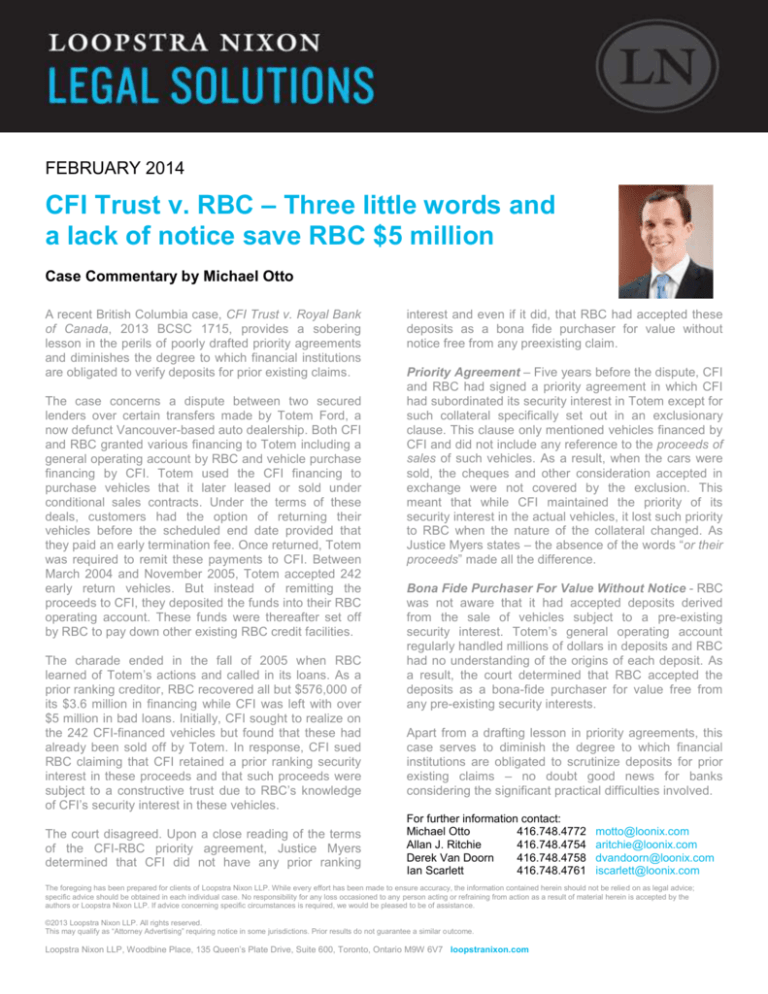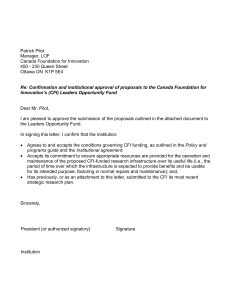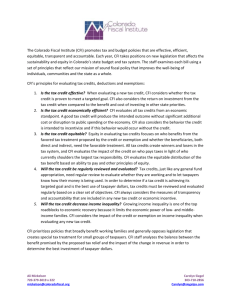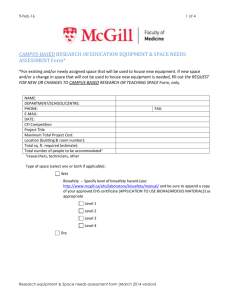
FEBRUARY 2014
CFI Trust v. RBC – Three little words and
a lack of notice save RBC $5 million
Case Commentary by Michael Otto
A recent British Columbia case, CFI Trust v. Royal Bank
of Canada, 2013 BCSC 1715, provides a sobering
lesson in the perils of poorly drafted priority agreements
and diminishes the degree to which financial institutions
are obligated to verify deposits for prior existing claims.
The case concerns a dispute between two secured
lenders over certain transfers made by Totem Ford, a
now defunct Vancouver-based auto dealership. Both CFI
and RBC granted various financing to Totem including a
general operating account by RBC and vehicle purchase
financing by CFI. Totem used the CFI financing to
purchase vehicles that it later leased or sold under
conditional sales contracts. Under the terms of these
deals, customers had the option of returning their
vehicles before the scheduled end date provided that
they paid an early termination fee. Once returned, Totem
was required to remit these payments to CFI. Between
March 2004 and November 2005, Totem accepted 242
early return vehicles. But instead of remitting the
proceeds to CFI, they deposited the funds into their RBC
operating account. These funds were thereafter set off
by RBC to pay down other existing RBC credit facilities.
The charade ended in the fall of 2005 when RBC
learned of Totem’s actions and called in its loans. As a
prior ranking creditor, RBC recovered all but $576,000 of
its $3.6 million in financing while CFI was left with over
$5 million in bad loans. Initially, CFI sought to realize on
the 242 CFI-financed vehicles but found that these had
already been sold off by Totem. In response, CFI sued
RBC claiming that CFI retained a prior ranking security
interest in these proceeds and that such proceeds were
subject to a constructive trust due to RBC’s knowledge
of CFI’s security interest in these vehicles.
The court disagreed. Upon a close reading of the terms
of the CFI-RBC priority agreement, Justice Myers
determined that CFI did not have any prior ranking
interest and even if it did, that RBC had accepted these
deposits as a bona fide purchaser for value without
notice free from any preexisting claim.
Priority Agreement – Five years before the dispute, CFI
and RBC had signed a priority agreement in which CFI
had subordinated its security interest in Totem except for
such collateral specifically set out in an exclusionary
clause. This clause only mentioned vehicles financed by
CFI and did not include any reference to the proceeds of
sales of such vehicles. As a result, when the cars were
sold, the cheques and other consideration accepted in
exchange were not covered by the exclusion. This
meant that while CFI maintained the priority of its
security interest in the actual vehicles, it lost such priority
to RBC when the nature of the collateral changed. As
Justice Myers states – the absence of the words “or their
proceeds” made all the difference.
Bona Fide Purchaser For Value Without Notice - RBC
was not aware that it had accepted deposits derived
from the sale of vehicles subject to a pre-existing
security interest. Totem’s general operating account
regularly handled millions of dollars in deposits and RBC
had no understanding of the origins of each deposit. As
a result, the court determined that RBC accepted the
deposits as a bona-fide purchaser for value free from
any pre-existing security interests.
Apart from a drafting lesson in priority agreements, this
case serves to diminish the degree to which financial
institutions are obligated to scrutinize deposits for prior
existing claims – no doubt good news for banks
considering the significant practical difficulties involved.
For further information contact:
Michael Otto
416.748.4772
Allan J. Ritchie
416.748.4754
Derek Van Doorn
416.748.4758
Ian Scarlett
416.748.4761
motto@loonix.com
aritchie@loonix.com
dvandoorn@loonix.com
iscarlett@loonix.com
The foregoing has been prepared for clients of Loopstra Nixon LLP. While every effort has been made to ensure accuracy, the information contained herein should not be relied on as legal advice;
specific advice should be obtained in each individual case. No responsibility for any loss occasioned to any person acting or refraining from action as a result of material herein is accepted by the
authors or Loopstra Nixon LLP. If advice concerning specific circumstances is required, we would be pleased to be of assistance.
©2013 Loopstra Nixon LLP. All rights reserved.
This may qualify as “Attorney Advertising” requiring notice in some jurisdictions. Prior results do not guarantee a similar outcome.
Loopstra Nixon LLP, Woodbine Place, 135 Queen’s Plate Drive, Suite 600, Toronto, Ontario M9W 6V7 loopstranixon.com










